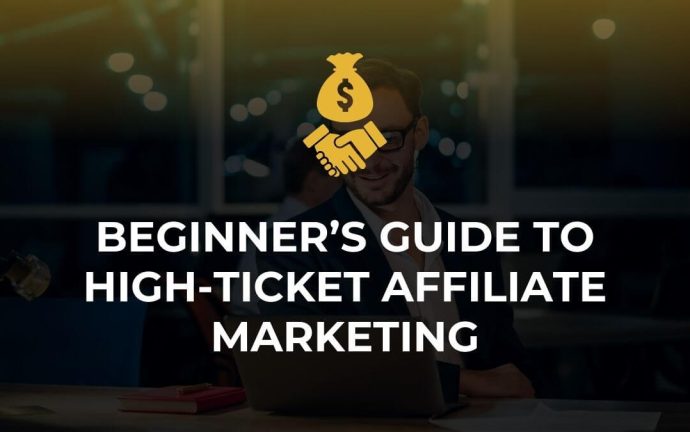
How to Start High Ticket Affiliate Marketing Today: A Comprehensive Guide
In this guide, I’ll show you exactly why high-ticket affiliate marketing is one of the best ways to generate income online – without any inventory, shipping hassles, or customer service woes.
We’ll cover how you can build a real online business that’ll let you quit that 9-5 job for good. High-ticket affiliate marketing is the key to a passive income lifestyle.
The best part? You don’t even need to be a high-level marketing expert to make this work. I’ll break it down step-by-step.
By the time you’re done reading, you’ll be ready to start cashing in on those juicy, high-ticket commissions.
Ready to kickstart your own affiliate marketing business? Join my 72 Hour Freedom Challenge and start promoting products in just minutes!
What is High-Ticket Affiliate Marketing?
High-ticket affiliate marketing is all about cashing in on more expensive sales.
Instead of promoting low-ticket products where you’re only making a few bucks per sale, high-ticket affiliate marketing allows you to earn bigger commissions. We’re talking $500, $1,000, even $3,000 or more per sale here!
Now, I know what you’re thinking: “Jonathan, won’t those high-ticket products be really hard to sell?”
Nope! If you calculate the effort involved in lower-ticket products, it’s way easier to make big-ticket sales than to grind out a bunch of smaller ones.
Why High-Ticket? STOP with Low-ticket NOW
Here’s the deal—with low-ticket affiliate marketing, you often have to make 120 or even 150 sales to hit a decent level of income. That’s a lot of work. But with high-ticket affiliate marketing, you only need one or two sales to make the same amount.
For example, I tested both approaches to see how hard affiliate marketing is with low-ticket versus high-ticket products. With low-ticket products, I got around 20-30 sales at a $25 profit per sale, about $650 in net profit. Not bad, right?
But then I tried the high-ticket route, promoting a $6,000 product with a 50% commission. With just one sale, I made $3,000. That’s over four times more than I made with all those low-ticket sales combined! And it took way less effort.
The math speaks for itself, guys. High-ticket is simply a more efficient and profitable model. When you’re promoting products that pay out massive commissions, you don’t need nearly as many sales to hit your income goals.
People in the market for high-ticket products are usually much more qualified and ready to buy. They’re looking for real value, not just the cheapest option.
If you can position yourself as an expert, build that trust, and show them how your product will genuinely transform their life or business, they’ll be more than happy to pull out their wallets.
Plus, you don’t even have to create those high-ticket products yourself. All you have to do is find existing ones, promote them as an affiliate, and rake in the commissions.
There is no product creation, shipping, or customer service.
When to Choose Done-For-You Affiliate Marketing
And here’s where done-for-you affiliate marketing shines. If you’re new to this or simply don’t have the time to set everything up, done-for-you services can be a game-changer.
Programs like our 72-Hour Freedom Challenge take care of finding high-ticket products, setting up affiliate links, and even managing marketing campaigns.
It’s like having a personal team do all the heavy lifting for you so you can focus on scaling your income without getting bogged down in the details.
Leveraging “done-for-you” affiliate marketing can bypass the learning curve for beginners and allow you to get straight to earning big commissions with high-ticket products.
It’s an ideal solution if you’re looking to maximize your earnings with minimal effort.
So, if you’re tired of chasing after countless low-ticket sales and want a more straightforward path to success, considering a “done-for-you” service could be the smart move.
When to Choose Done-For-You Affiliate Marketing

You’re probably wondering if someone who’s just getting start can really dive into high-ticket affiliate marketing and become an affiliate marketer. The answer is a resounding YES!
And I’m not just saying that. High-ticket affiliate marketing is not just for the so-called gurus or marketing wizards. There are many high-ticket niches for beginners that can be a great starting point for building a successful affiliate marketing business.
Anyone can tap into this lucrative field with the right guidance and a solid strategy. What you need is a willingness to learn, persistence, and a bit of creativity to stand out.
Here’s where it gets even better: plenty of free affiliate marketing tools are available online to support your journey. These tools can help you find the right products to promote, optimize your marketing efforts, and track your progress without investing a fortune upfront.
In affiliate marketing, you can either build a strategy from scratch or adopt a proven model.
The first approach involves selecting products, setting up marketing channels, and managing payouts—requiring considerable effort and time. Not to mention that you don’t get expert guidance on what tactics to use for promoting offers.
The second approach, available in my 72-hour Freedom Challenge, lets you clone a proven business model and use carefully created resources to attract customers. This method simplifies the process and accelerates success, leveraging the strength of an established affiliate network.
Consider joining the challenge so you can start your affiliate marketing journey today!
Competition in High-Ticket Affiliate Marketing
You might be wondering about how competition can affect your payday. Sure, there’s competition, but that’s where your unique voice and perspective come into play.
Remember, people buy from people they like and trust. As a beginner, you have a fresh outlook and can relate to your audience’s challenges and aspirations – often better than someone who’s been in the game for years!
And here’s the best part—you learn by doing. Every step you take in promoting high-ticket offers helps you build your skills in sales, content creation, and online marketing. Each challenge you overcome makes you stronger and more capable.
So, by the time you land your first high-ticket commission, you’re not a beginner anymore; you’re a marketer who’s proven they can play in the big leagues.
I get it; selling high-ticket items might seem daunting at first. But remember, marketing principles are the same regardless of the price tag.
It’s about finding the right audience, understanding their needs, and offering them a solution that makes a difference in their lives. And with high-ticket items, you’re just solving bigger problems, which means bigger rewards for you and your customers.
How to Start High-Ticket Affiliate Marketing
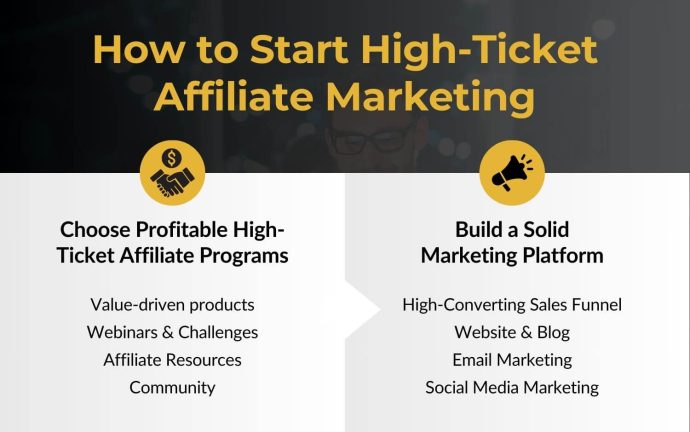
Let’s dive into the heart of the matter—how to become an affiliate marketer for high-ticket programs. This section will be your roadmap to confidently beginning high-ticket affiliate marketing.
You’re about to discover how to pinpoint profitable programs, position yourself as a trusted advisor, and promote products in a way that feels authentic and converts like crazy.
Finding Profitable High-Ticket Affiliate Programs
Let’s zero in on the first and possibly the most critical step in your high-ticket affiliate marketing business: finding profitable programs.
There are several factors to consider when evaluating the right program for you. We’ll cover them below.
Value-Driven Products
The first thing to look for are offers that provide insane value. These aren’t necessarily characterized just by their cost but offers that solve a significant problem or fulfill a primary need for your audience.
For example, I bought a $20,000 course on selling Airbnbs. I had no idea how to buy houses, put them on Airbnb, or set up the business structure. So, I knew it was worth it if I could learn that skill and learn how to do Airbnb and make that money back.
The cost upfront? Yeah, it’s a significant number. But the skills and returns? Absolutely mind-blowing.
Webinars and Challenges
I usually advise students to look for high-ticket programs with front-end webinars or challenges.
Why? Because these engaging formats do an incredible job of providing value and education upfront.
They take potential buyers on a journey, explaining why the high-ticket item is an investment worth making. It’s about showing, not just telling, the value.
Affiliate Resources
Most high-quality affiliate programs provide a treasure trove of marketing materials, such as landing pages, email swipes, banners, and more.
These resources are designed to help you hit the ground running, minimizing your workload in creating marketing content from scratch.
Your focus should be driving traffic and guiding potential buyers through the funnel; these tools are your best allies.
Community
Once you’ve pinpointed the perfect high-ticket products, it’s time to leverage every resource at your disposal, including an often-overlooked but incredibly valuable asset: community.
The community surrounding these affiliate programs is a goldmine of knowledge, support, and inspiration. Engaging with this community can dramatically elevate your affiliate marketing game.
Within these communities, affiliates share their successes, failures, and everything in between. This collective wisdom is invaluable, offering insights into what works and doesn’t, saving you time, and helping you avoid common pitfalls.
Building a Solid Foundation for Marketing Affiliate Programs
Now let’s take a look at how you can set up a system for attracting buyers to the affiliate program you’ve chosen. We’ll cover how you can make folks sit up and notice your offers.
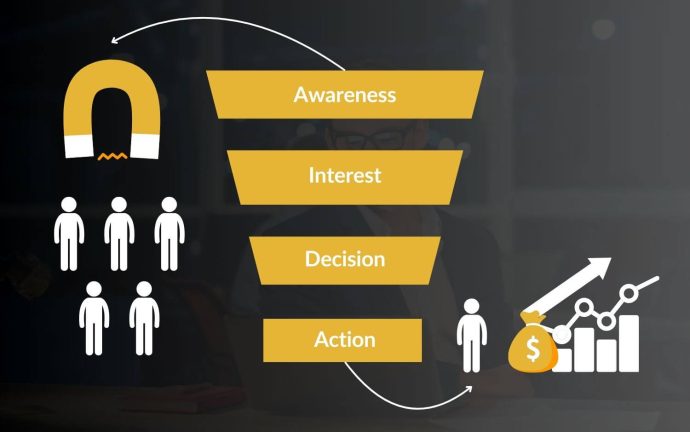
Creating a High-Converting Sales Funnel
A sales funnel is your customer’s journey from awareness to purchase.
By taking steps to attract, engage, and convert potential customers, you can set up a system that generates affiliate revenue on autopilot.
Here’s how to create your own sales funnel.
First: Understand Your Target Audience
It’s critical to know who your target audience is so you can effectively reach them. Information like their challenges, and preferences.
Demographics: Delve into understanding who your customers are by analyzing demographic and psychographic data. Gender, age, socio-economic status, occupation, and other data is helpful in shaping
how you communicate with your audience.
Challenges: Explore what challenges your ideal audience is facing and what solutions they are seeking. Positioning your offer at the height of their frustration is more likely to lead to sales.
Persona Creation: Develop detailed buyer personas by compiling data on your ideal customers’ behaviors, preferences, and decision-making processes. This will help you customize your marketing efforts to be more effective.
Understanding your target audience makes it more likely that your sales funnel will do its job of converting them into customers.
Second: Attract Attention with Lead Generation
Lead generation involves creating interest in your offer with the goal of turning that interest into sales.
You can use paid strategies like Facebook and Google ads or organic strategies like social media posts and blogging to reach your audience and generate leads.
Here’s a quick look at each option:
Content Marketing: To attract potential customers, utilize engaging content like blog posts, informative videos, compelling infographics, and active social media engagement. This content should address common questions and offer valuable insights.
Paid Advertising: Implement targeted advertising strategies, including pay-per-click (PPC) campaigns, social media ads, and display ads to boost traffic and visibility.
SEO: Enhance your website’s search engine optimization by focusing on key SEO practices such as keyword research, on-page optimization, and building high-quality backlinks to draw organic traffic.
The goal in all of this is to offer value to your prospective customers so they view you as a trusted source within your niche.
Third: Capture Leads
It’s one thing to generate interest in your offer and another thing entirely to get prospects to identify themselves. But, without having information on the specific people interested in your offer, you won’t have a way to consistently nurture them to take action.
You can capture your leads information in a variety of ways but my favorite is using lead magnets.
A lead magnet is a free resource like an eBook, course, guide, tool, or other resource that provides significant value to your audience. So much so that they’re willing to exchange contact information to obtain it.
The goal is to establish your authority and earn trust while you build your email list of prospective customers.
Fourth: Nurture Leads with Email Marketing
Once you have your list of prospects, the real fun begins! Building trust with your audience and nurturing them toward conversion is the last step to monetizing your affiliate marketing efforts.
The best way to do that is with email marketing. By consistently emailing your contacts with valuable information, tips and tricks, and interesting offers, you can build rapport and drive engagement.
The key is consistency.
You must stay in contact with your list! Some experts say to email your list as often as once a day to remain visible.
The primary takeaway is that you should never let your list go stale – many entrepreneurs consider their email list to be their biggest business asset.
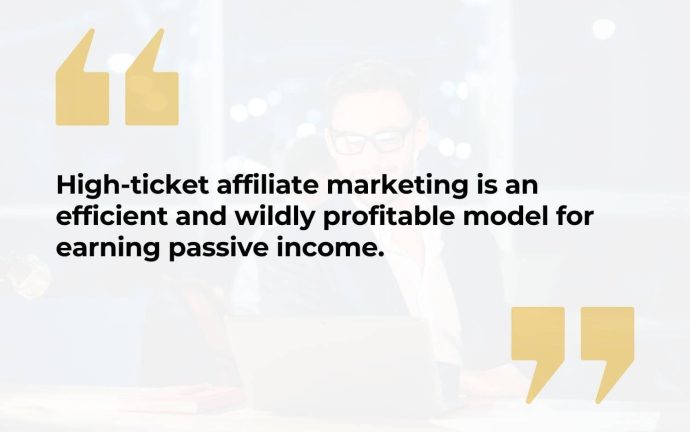
Building a Website and Blog
A website is essential for your affiliate marketing business because it provides a platform for creating and sharing valuable content to attract and engage potential customers.
By consistently publishing high-quality content on your blog, you can establish yourself as an authority in your niche, build trust and loyalty with your audience, and generate more leads and conversions.
Still not convinced? Here are a few more reasons why a website is a must:
Generates traffic: A blog can help you attract more traffic to your website by providing valuable content that addresses your audience’s questions and pain points. By optimizing your blog posts for search engines, you can improve your visibility and attract more organic traffic to your site.
Builds trust and authority: By consistently publishing high-quality content on your blog, you can establish yourself as an authority in your niche and build trust with your audience. This can help you build a loyal following and increase your credibility as an affiliate marketer.
Provides a platform for promoting affiliate products: A blog can provide a platform for promoting affiliate products naturally and organically. By including affiliate links in your blog posts, you can earn commissions on any sales generated through your affiliate links.
Allows for content repurposing: A blog can provide content that can be repurposed for other marketing channels, such as social media, email marketing, and podcasting. This can help you reach a wider audience and increase your exposure as an affiliate marketer.
Helps with long-term SEO: A blog can help improve your website’s long-term SEO by providing fresh content that search engines love. By consistently publishing new blog posts, you can improve your website’s search engine rankings and attract more organic traffic to your site.
The best thing about having a website is that you own the platform. Unlike social media and advertising where you rent someone else’s platform, you control the content on your own site.
Email Marketing
Like we saw above, email is the best way to nurture the audience you’ve built. Below are some best practices for ensuring your email marketing is on point.
Lead Magnets: Develop compelling lead magnets that align with your audience’s needs. This could be an in-depth eBook, a webinar series, or access to exclusive videos that provide value beyond essential blog content.
Segmentation and Personalization: Segment your email list based on user behavior and preferences to personalize your communications. Tailored emails significantly increase engagement and conversion rates.
Automation: Use email marketing automation tools to deliver timely and relevant content to your subscribers. Automation can help manage lead nurturing campaigns efficiently, ensuring no missed opportunities.
Analytics and Optimization: Monitor key metrics such as open, click-through, and conversion rates. Use this data to refine your email strategies, testing different messages and formats to see what resonates best with your audience.
Social Media and Networking
Social media platforms and networking are excellent for connecting directly with potential customers and influencers in your niche.
Here are some tips for ensuring your social media marketing efforts yield results:
Platform Selection: Choose platforms where your target audience is most active. For high-ticket items, platforms like LinkedIn for B2B products or Instagram for lifestyle and luxury products might be most effective.
Content Strategy for Social Media: Tailor your content to fit the style and format of each platform. Use engaging visuals, create platform-specific offers, and share success stories or testimonials highlighting the value of high-ticket products.
Community Engagement: Actively engage with users through comments, messages, and posts. Join relevant groups or forums where you can contribute meaningful advice and become a go-to resource.
Influencer Collaborations: Partner with influencers who can authentically endorse your high-ticket items. Their endorsement can significantly expand your reach and lend credibility to your offerings.
Paid Social Advertising: Use paid advertising options to increase reach and target specific demographics. Well-crafted ads can drive traffic to your content or directly to product pages.
Building a solid platform across these three areas—a content-rich website, strategic email marketing, and effective social media use—will provide a robust foundation for your high-ticket affiliate marketing efforts and enhance your visibility and authority in the niche.
The path to success in affiliate marketing requires commitment and effort. But with the right program, you can significantly accelerate the process.
That’s why I created the 72-Hour Freedom Challenge. By eliminating the barriers to success, you can concentrate on reaching your financial goals.
Best Niches for High-Ticket Affiliate Marketing
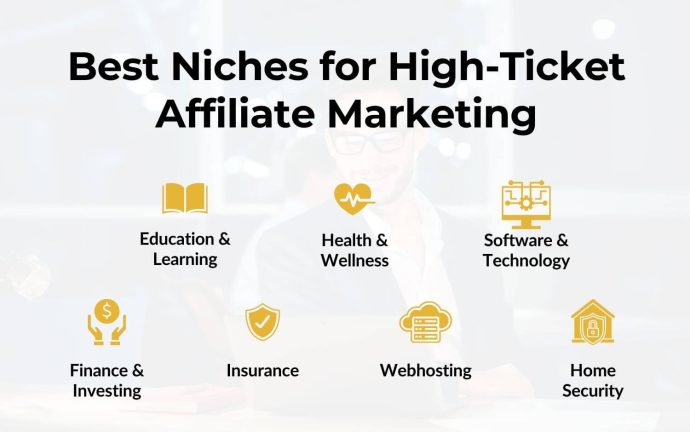
Identifying the right niche is critical when starting in high-ticket affiliate marketing, as it directly influences your potential for profit. It’s also important to align your marketing with consumer interests and market demand.
Here’s my list of the top niches where high-ticket items thrive, allowing affiliates to capitalize on lucrative market segments.
Education and Learning
First is the Education and Learning niche. We’re talking everything from online courses to certification programs, tutoring, and even educational software.
Imagine getting a cut from promoting killer tech courses or maybe some creative arts classes.
The job market is changing fast, and everyone’s trying to keep up! So, yeah, this niche? It’s a hot ticket for any affiliate.
Health and Wellness
Health and Wellness is exploding with opportunities. Think high-end supplements, the latest fitness gear, or personal health coaching and wellness retreats.
Everyone’s looking to upgrade their life and longevity. You could be the one guiding them to these transformative products. Big sales, big commissions!
Software and Technology
The Software and Technology niche is on fire! From enterprise software that established companies need to cybersecurity and the latest tech gadgets—there’s a ton to get behind.
Plus, lots of these products are sold through subscriptions, which means you earn recurring revenue!
Insurance
Insurance—sure, it might not sound sexy, but it’s absolutely essential. From life and health insurance to cars, homes and businesses, these are big-ticket items that mean big returns.
Policies with significant premiums generate high-ticket commissions, catering to individuals and businesses.
Affiliates can succeed in this niche by connecting their audience with insurance products that provide peace of mind and financial security.
Finance and Investing
The Finance and Investing niche is perfect for high-ticket affiliate marketing because it focuses on wealth management, investment strategies, and financial services.
This niche is about upscale investment advice, sophisticated financial planning, and top-tier trading software. Help your audience grow their wealth, and guess what? Your profits grow, too!
Web Hosting
Every successful online business starts with solid web hosting.
Promoting top-notch hosting services, like dedicated servers or managed hosting, not only helps others build their dreams but also fills your pockets thanks to essential services and recurring revenue.
Home Security
Last up, but no less lucrative, is Home Security. With the demand for smart, reliable home protection soaring, this is a prime area to jump into.
From state-of-the-art security systems to round-the-clock monitoring, helping folks feel safe is rewarding and profitable.
Each of these niches offers unique perks and challenges, but tapping into what you love and know best can turn your affiliate game into a major league success.
Top 5 High-Ticket Affiliate Programs
Let’s take a look at 5 of the best high-ticket affiliate program I’ve personally hand-picked for my audience. Now, let me say this: unlike the typical products you’d find on ClickBank or JVZoo, these are private, high-ticket programs that offer significant earning opportunities.
Want to learn more about these programs? Check out my video, where I explain in more detail how the programs work:
1. Goldco
Specializing in alternative investments like gold and silver, Goldco helps people protect their retirement accounts from stock market crashes and inflation.
They pay affiliates for leads and sales, with commissions potentially reaching $100,000 based on the amount invested by the referral. Goldco offers $100 per lead and a percentage (around 3-6%) of the investment made by the lead.
2. Bitcoin IRA Affiliate Program
This program is similar to Goldco but focuses on investments in Bitcoin within individual retirement accounts (IRAs).
The commissions are slightly lower (5-10%), but the earning potential remains significant since these are high-ticket investments aimed at retirement savings.
3. Amazing Selling Machine
This program teaches how to start an Amazon FBA (Fulfillment by Amazon) business. It pays up to $2,500 per sale and is endorsed by well-known business figures.
For years, it has been one of the highest-paying affiliate opportunities.
4. Legendary Marketer
Legendary Marketer offers digital marketing education and pays 30-60% commissions. It’s free to join and includes benefits like done-for-you sales funnels and a sales team to help close high-ticket sales on behalf of the affiliate.
Legendary Marketer provides a comprehensive system for managing and promoting various products and services.
5. Freedom Breakthrough 3.0
This program I created pays 50% commissions and uses a webinar to promote a high-ticket product related to leveraging short videos for business growth.
The system includes extensive support materials like email and video ad swipes and tracks customer progress to aid in closing sales.
It’s been a powerhouse in terms of click value and conversion rates!
Why Affiliate Marketers Fail
I’ve seen a ton of affiliate marketers come into the space recently, but the sad thing is that 90% of these people are going to fail at affiliate marketing in the next five years.
You don’t have to be one of the casualties whose business fails.
Instead, focus on four things, which we’ll cover in more detail below:
Developing a Solid Business Foundation
Remaining Consistent with Marketing
Focusing on the Long Term
Choosing the Best Program
Developing a Solid Business Foundation
Creating a solid business foundation is essential for anyone looking to succeed in high-ticket affiliate marketing.
This foundation is not just about having the right tools but involves setting up reliable systems, well-defined processes, and effective marketing assets backed by a sound strategy.
Here’s how you can build a robust base for your affiliate marketing business that stands the test of time.
Establish Clear Systems and Processes
To thrive in the competitive world of high-ticket affiliate marketing, you need to establish clear systems and processes. This means setting up a workflow that allows you to manage your marketing campaigns efficiently.
Automate repetitive tasks with tools like CRM systems, email marketing software, and campaign management tools.
This automation will free up your time, allowing you to focus on strategy and growth.
And, if you want to shortcut the process, you can clone my entire business system! Get started here.
Invest in Quality Marketing Assets
Your marketing assets are the face of your affiliate business. These include your website, content, social media profiles, and any promotional materials you use to attract and engage with your audience.
Invest in professional-quality design and high-quality content that reflects the value of the high-ticket products you are promoting.
Remember, first impressions matter, and in a field where trust is paramount, looking the part is half the battle.
Develop a Sound Marketing Strategy
A sound marketing strategy is crucial in driving the success of your high-ticket affiliate business. Start by understanding your target market’s needs and preferences, then tailor your marketing efforts to match these insights.
Focus on inbound marketing techniques such as SEO, content marketing, and social media engagement to draw potential customers to you rather than reaching out to them.
We’ll discuss this in further detail below.
Leverage Analytics for Continuous Improvement
To ensure your business foundation remains solid, you must leverage analytics to continually improve your strategies.
Use tools like Google Analytics, Google Search Console, and social media analytics to track the performance of your marketing efforts.
Pay close attention to what works and what doesn’t, and be prepared to pivot your strategy based on real-world data. This will help you optimize your processes and improve ROI over time.
By focusing on these key areas, you can build a strong business foundation that not only supports your current affiliate marketing endeavors but also scales for future growth.
A solid foundation is not built overnight but through consistent effort and strategic planning.
Remaining Consistent with Marketing
Consistency is the key to success in high-ticket affiliate marketing.
Staying active and persistent with your marketing efforts can help you build a loyal audience, enhance your brand’s credibility, and ensure a steady stream of income.
Here’s how you can maintain consistency in your marketing to maximize your high-ticket affiliate success.
Develop a Content Calendar
One of the best ways to ensure consistency is to plan your marketing activities in advance using a content calendar.
This should include scheduled posts for your blog, social media updates, email newsletters, and any promotional campaigns you plan to run.
A content calendar helps you stay organized, keeps your marketing efforts aligned with your strategic goals, and prevents last-minute rushes that can lead to poor-quality content.
Regularly Update Your Blog and Social Media
Your blog and social media channels are essential tools in your affiliate marketing arsenal.
Regular updates keep your audience engaged and help drive traffic to your affiliate links. Aim to post fresh, relevant content that provides value to your readers.
This could be in-depth guides, how-to articles, product reviews, or updates on industry trends that will interest your target audience.
Engage with Your Audience
Consistency isn’t just about pushing out content; it’s also about consistently engaging with your audience. Make it a point to respond to comments, messages, and emails.
Participation in discussions on your platforms and relevant forums can also enhance your visibility and reinforce your reputation as a reliable and responsive marketer.
Monitor Your Performance
To keep your marketing efforts effective, regularly monitor your performance and adjust your strategies as needed.
Analyze which types of content generate the most engagement and sales, and which platforms are most effective for your marketing efforts.
This ongoing evaluation will not only help you optimize your ROI but also keep your strategies aligned with market trends.
Stay True to Your Brand
Maintaining a consistent brand voice and message across all your marketing channels is crucial.
Your audience should be able to immediately recognize your content and associate it with your brand, whether they see it on a blog, a social media post, or an email. This consistency builds trust and helps establish a strong, reliable brand.
By implementing these strategies, you can ensure that your marketing efforts are consistent and effective, helping you to build a sustainable and profitable high-ticket affiliate marketing business.
Consistency leads to visibility, which in turn leads to profitability.

Focusing on the Long Term
When I started my online business in May 2019, I simply wanted to make extra money. As a beginner, your primary goal is to earn additional income.
But you need to start thinking as you build your business: How can you build your business for the long term?
Develop a long-term traffic strategy will build up a customer list and continuously bring fresh leads into your business.
This could involve expanding your presence on other social media platforms, starting a blog, or focusing on search engine optimization (SEO) for long-term organic search traffic.
Build Your Email List: An email list is a direct line to your audience that isn’t subject to algorithm changes or platform trends. By building and nurturing your email list, you create a sustainable asset that allows for personalized engagement with your audience.
Create Your YouTube Channel: A YouTube channel is considered a vital component of a long-term traffic strategy. Unlike short-form content platforms, YouTube can drive consistent, long-term traffic to your affiliate offers through evergreen content that continues to rank and attract viewers over time.
Starting a Blog: Kick off your own blog to anchor your affiliate marketing efforts. It’s your space to express insights, highlight products, and leverage SEO to boost visibility in search engines. Regular, engaging posts build your credibility and draw a loyal following. Your blog also integrates smoothly with other channels, enhancing your overall strategy and establishing a robust digital presence that fuels long-term success.
Learning SEO: Generating traffic through organic search is a common and effective way to earn money through affiliate marketing without social media followers. Creating valuable and informative content that ranks high in search engines like Google can attract visitors interested in the products or services you are promoting.
Focus on Quality Content Creation: High-quality, valuable content tends to stand the test of time. Focusing on creating relevant evergreen content can help attract and retain an audience, regardless of changing trends.
Stay Informed and Flexible: Keeping abreast of industry trends and being willing to adjust your strategies as needed can help you navigate changes more effectively. This might involve adopting new content formats, exploring emerging platforms, or revising your messaging to align with current trends.
Choosing the Best Program
The right affiliate marketing program will already have systems, processes, and marketing strategies built into it.
By investing in an expertly developed program at the start of your journey, you can save massive amounts of time, energy, and money while making sure you get off on the right foot.
That’s why I created the 72 Hour Freedom Challenge.
Pros & Cons: Affiliate Marketing Vs. Ecommerce
I often get asked to compare affiliate marketing to ecommerce.
Affiliate marketing involves promoting products for a commission without owning them, while e-commerce entails selling products directly to customers with full ownership and control over the business.
Each model has advantages and considerations, making it suitable for different goals and preferences in the online business landscape.
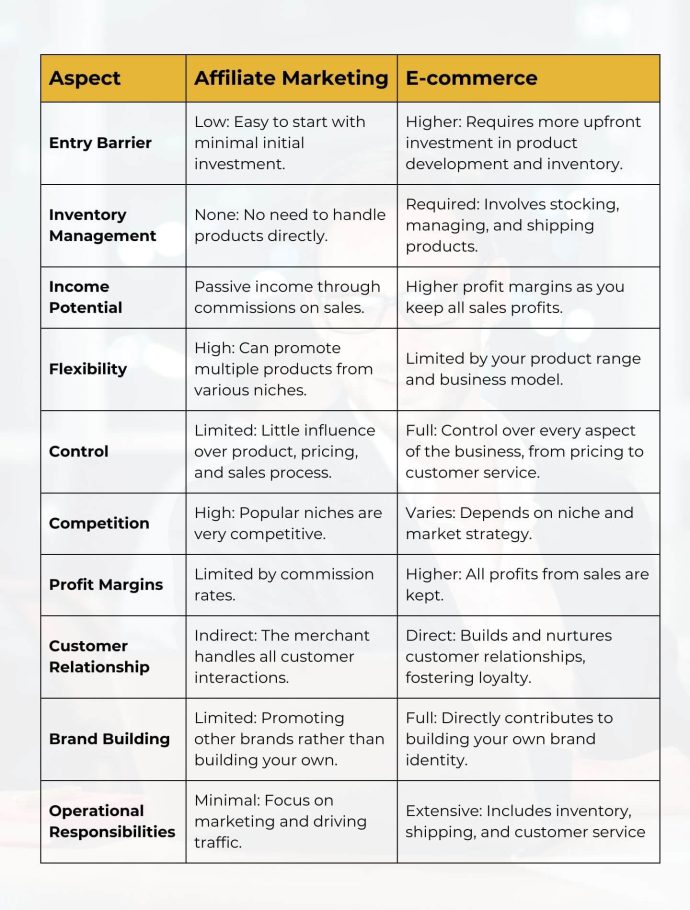
Affiliate Marketing Pros
Low Entry Barrier: With no need to develop your own products or manage inventory, starting as an affiliate marketer can be relatively straightforward and cost-effective.
No Inventory Management: Since you’re promoting products for other companies, you don’t deal with the complexities of stocking or shipping products.
Passive Income Potential: Once your promotional content is in place and ranking, affiliate marketing can offer a form of passive income, earning you money without ongoing effort.
Flexibility: Affiliate marketing allows you to choose which products to promote, enabling you to pivot your strategies based on market trends or interests.
Affiliate Marketing Cons
Dependence on Merchant Success: Your earnings are tied to the merchant’s product quality and customer service. Poor performance on their end can affect your commissions.
Limited Control: You have minimal influence over product pricing, features, and the sales process, which can limit how you market the products.
Competition: Popular affiliate marketing niches are highly competitive, making it challenging to stand out and earn significant commissions.
E-commerce Pros
Full Control: E-commerce grants you control over every aspect of your business, from product creation to pricing strategies and customer service, allowing for a tailored brand experience.
Higher Profit Margins: Selling your products means you keep the entire profit margin, unlike affiliate marketing, where you earn a commission.
Customer Relationship: Directly selling to your customers allows you to build and nurture relationships, fostering loyalty and repeat business.
Brand Building: E-commerce offers the opportunity to build a brand and establish a direct relationship with your audience, potentially increasing the value of your business.
E-commerce Cons
Higher Initial Investment: Starting an e-commerce business often requires significant upfront investment in product development, inventory, and platform setup.
Inventory Risks: Managing inventory comes with risks, including overstocking or stockouts, which can directly impact your business operations and finances.
Customer Service Challenges: Being responsible for customer service can be demanding, requiring resources and systems to handle inquiries, complaints, and returns effectively.
Marketing Responsibilities: You’re in charge of driving traffic to your store, which means you need to invest in marketing and advertising strategies to attract customers.
Key Differences
Ownership and Control: E-commerce owners have complete control over their products and business operations, while affiliate marketers promote others’ products with limited control.
Financial Investment: Starting an e-commerce business requires more upfront financial investment than affiliate marketing, which can be started with minimal costs.
Revenue Model: E-commerce businesses earn through direct sales, keeping all profits, whereas affiliate marketers earn commissions based on sales through their unique links.
Operational Responsibilities: E-commerce entails managing inventory and customer service, while affiliate marketing focuses on driving sales without the operational burdens.
Choosing between affiliate marketing and e-commerce depends on your personal preferences, resources, and business goals.
Both models offer exciting opportunities but come with their set of challenges.
Consider what aligns best with your aspirations, whether it’s the creative control and potential rewards of e-commerce or the flexibility and lower barriers to entry of affiliate marketing.
Affiliate Vs. Influencer Marketing
Two strategies that often arise in digital marketing are affiliate and influencer marketing. While both share the goal of promoting products and driving sales, their approaches, methodologies, and outcomes can differ significantly.
Let’s explore these differences and understand how each can be leveraged for distinct marketing objectives.

Outreach Model
Affiliate Marketing thrives on a broad network model. It leverages platforms to connect with potentially hundreds of affiliates quickly, making it a scalable approach to reach diverse audiences through various affiliate websites, blogs, and other digital entities.
This wide-reaching method is efficient for brands looking to expand their visibility across multiple channels simultaneously.
Influencer Marketing, on the other hand, typically focuses on more personalized, one-on-one relationships with influencers.
Brands partner with social media stars, bloggers, and personalities with significant followings on platforms like Instagram, YouTube, and Twitter.
This strategy aims for depth rather than breadth, prioritizing meaningful engagement with a highly engaged audience over the sheer volume of impressions.
Partnership Model
Affiliate Marketing involves a partnership with online publishers, bloggers, and website owners where advertisements or product links are placed.
The relationship is transactional, with affiliates rewarded for the traffic or sales they generate through their unique affiliate links.
Influencer Marketing necessitates a more collaborative effort between brands and influencers. The partnership is often more fluid and creative, allowing influencers to integrate the brand’s message into their content naturally and authentically.
This can include sponsored posts, product reviews, and endorsements that resonate with the influencer’s audience.
Performance Model
In Affiliate Marketing, the performance of each ad and the resulting ROI are straightforward to track. Brands can monitor clicks, conversions, and other metrics to measure the effectiveness of their affiliate partnerships.
This makes affiliate marketing highly attractive for performance and direct sales brands.
Influencer Marketing offers a different level of detailed performance tracking.
While some metrics, such as engagement rates and reach, can be measured, the impact of influencer marketing is often seen in brand awareness and perception shifts over the long term. It’s a strategy best suited for building brand loyalty and expanding audience engagement.
Hybrid Forms and Similarities
Interestingly, there’s a convergence between these two strategies where influencers engage in affiliate marketing.
Influencers can promote products using affiliate links, blending the credibility and reach of influencer marketing with the performance-driven approach of affiliate marketing.
Both strategies thrive on a brand’s ability to connect with the right partners. Whether through an affiliate network or an influencer collaboration, success hinges on aligning with individuals or entities whose audiences are well-matched with the brand’s target market.
While both Affiliate and Influencer Marketing boost brand visibility and sales, they serve distinct marketing purposes. Affiliate Marketing is best suited for brands prioritizing a performance-driven approach to increasing sales across multiple channels.
Conversely, Influencer Marketing is excellent for deepening audience relationships through credible figures, fostering lasting brand impressions and loyalty.
Take the Next Step to Your Financial Freedom
Starting might seem like you’re stepping into uncharted territory, but trust me, it’s easier than it looks. It’s all about laying the proper foundation, choosing the best strategies, and finding those juicy, high-ticket affiliate programs that’ll make your wallet sing.
Start your high-ticket affiliate marketing business in 3 days! Our 72-hour Freedom Challenge takes you from a complete newbie to earning six—and seven-figure commissions using our insanely powerful BLUEPRINT.
About the Author

Jonathan Montoya is the founder of the 72 Hour Freedom Challenge, which has empowered over 55,000 people to leave their 9-5 jobs and achieve their dream lifestyles.
After starting his own online business in May 2019, Jonathan transitioned from Electrical Engineer to full-time entrepreneur within nine months. His mission is to help others reach their financial and lifestyle goals quickly and easily.
Jonathan’s unique approach to affiliate marketing has enabled him to reach over 600,000 people who are working to quit their 9-5.
Outside of his professional achievements, Jonathan cherishes time with his wife and children, who have been a constant source of support and inspiration throughout his journey. Read more about Jonathan here.
